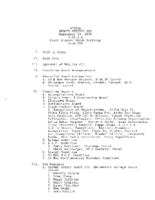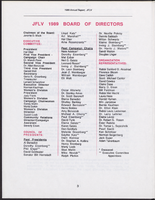Search the Special Collections and Archives Portal
Search Results

Meeting minutes for Consolidated Student Senate, University of Nevada, Las Vegas, September 18, 1979
Date
Archival Collection
Description
Text

Alan Stock oral history interview: transcript
Date
Archival Collection
Description
Oral history interview with Alan Stock conducted by Barbara Tabach on December 27, 2017 for the Remembering 1 October Oral History Project. In this interview, Alan Stock discusses moving to Las Vegas, Nevada in 1999 for his job as a radio talk show host for KXNT. Stock describes the broadcast that covered the October 1, 2017 Las Vegas mass shooting from 11 PM on that night until 9 AM the next morning. He talks about some of the calls the station received from various members of the community, including survivors of the shooting, families of those at the event, people on lockdown in the nearby hotels, doctors, and general listeners. Stock describes some of the topics discussed on the broadcast, such as what was currently happening on the Las Vegas Strip, stories of the aftermath, and the support needed from the general public. Other topics include gun control and conspiracy theories. He discusses the impact this and other shootings would have on public affairs, including tighter security in daily living and public gatherings. He compares security in the United States to security in Israel and other countries, focusing on the idea of unconcealed guns worn in public. Throughout this interview, Alan Stock explains that the radio station's goal was to provide accurate information to the public during the aftermath of the October 1, 2017 mass shooting.
Text

Transcript of interview with Stella Champo Iaconis by Kay Long, May 14, 1997 & September 1997
Date
Archival Collection
Description
The Champo family, Jacinta and Manuel Champo and their daughter Stella came from Italy to Las Vegas in 1912. They lived in a room at the Union Hotel, which was located at Main and Bridger. In 1917, the Champo family bought a small ranch located about three miles south of what is Henderson today. Manuel grew fruits and vegetables at the ranch and sold them in town door to door. Stella began her education at Las Vegas Grammar School at Fourth and Bridger in 1918 and started babysitting for many of the local women when she was only ten years old. Jacinta’s death in 1927 was hard on both Stella and Manuel. Stella decided not to finish her education. Maude Frazier, who was the principal at the High School, tried to persuade Stella to stay at school. However, Stella had no more interest in school and at eighteen years old she started her career as a waitress. Her first job was at a small Italian restaurant at the Union Hotel where she learned the business. She worked as a waitress and cashier and when P.O. Silvagni opened the Apache Hotel at Second and Fremont she went to work there. Stella continued to work at the Apache until she moved to Los Angeles where she worked as a waitress for eighteen years. Stella had married John Iaconis in 1953 and they moved back to Las Vegas. Both John and Stella went to work at the Sahara Hotel. Stella was a showroom waitress and John was a tailor with his own valet shop in the Sahara Hotel. Stella worked in a showroom at Sahara for three years because it was physically demanding work. Stella went to work at Larry’s where she stayed for twenty years. Stella continued to live in Las Vegas until her death on January 18, 1998 . She was happily retired and always remembered the past and the lessons she learned from her hard work. Stella was a very optimistic and totally self-reliant woman.
Text

Emily McKinley interview, March 1, 1981: transcript
Date
Archival Collection
Description
On March 1st, 1981, Glorialyn Gutierrez interviewed Emily McKinley (b. April 28, 1930 in Las Vegas, Nevada) about her life in the Las Vegas Valley. McKinley begins by speaking about her childhood, her siblings and her extended family. McKinley gives a variety of anecdotes about being raised in Las Vegas, her family’s economic hardships and the house she grew up in. Lastly, McKinley talks about the businesses she owned with her husband, their hardships and her time working multiple jobs.
Text

Transcript of interview with Byron Underhill by Joyce Moore, March 20, 2002
Date
Archival Collection
Description
Byron Underhill's father owned the first Coca-Cola bottling plant, the first beer distributorship, and the first bowling alley in Las Vegas. Byron moved here from Needles, Calif., with his family in 1927. Byron later took over the bottling plant, served in the Army as an aircraft mechanic and a glider pilot during World War II, was a private pilot who worked with Search and Rescue, played in various bands, and suggested to the Lions club that they found a burn unit at University Medical Center that is still the only one in the state
Text

Ruth J. Kiley interview, January 24, 2013: transcript
Date
Archival Collection
Description
Rancho High School. Moved to Las Vegas in 1957 when she was thirteen. Ruth graduated from Rancho High School and worked with a variety of unions and casinos on their insurance claims
Text

Transcript of interview with Liliam Lujan Hickey by Claytee D. White, September 7, 2018
Date
Archival Collection
Description
Liliam Lujan Hickey was born in 1932 Havana, Cuba, where her father owned an insurance company and her mother was a music teacher. At age 17, Liliam married Enrique Lujan who owned five casinos and who was twelve years her senior. It was the early 1950s, and the people of Cuba lived with stark distinctions between upper class and low-income families. Liliam and Enrique lived a life of luxury. She became accustomed to flying to New York for dinner and wearing the finest Italian silks for custom dresses. Then in 1959, Liliam’s life took a vast turn as Fidel Castro rose to power and seized assets from the wealthy class. This upended Liliam’s family and in 1962, Liliam, Enrique and their three children fled to the United States. They first arrived in San Diego, California, where Liliam took a job at the Scripps Clinic. While Liliam spoke five different languages, she attended night school to learn English. Eventually, Liliam and her family moved to Las Vegas where Enrique could find work in the casinos. Unexpectedly in 1972, Enrique passed away, leaving Liliam and her children to fend for themselves. Liliam was thrust into the role of matriarch; she learned how to write a check and drive a car. She describes this as a period when her community activism awoke, how she secured a position working for the Nevada Welfare Administration Office, and how her persistent spirit led her to citizenship within a week. Through friends, Liliam met Nevada legislator Thomas Hickey, an Irish American who she endearingly nicknamed her Pink Husband. Liliam credits Senator Hickey with teaching her about life and the world, and ultimately inspiring much of her political activism. She was an active member of the Latin Chamber of Commerce, first known as el Circulo Cubano. At the peak of her career, Liliam became the first Latina to be elected to the Nevada State Board of Education. She envisioned building a village through schools in order to support and help all students be successful. A local Las Vegas school, Liliam Lujan Hickey Elementary School, was named in honor of her public service. Today, Liliam is retired, but continues to work to increase civic engagement in the Latinx community and improve our educational system.
Text

Transcript of interview with Nora Luna by Maribel Estrada Calderón, November 7, 2018
Date
Archival Collection
Description
Nora Luna (1971 - ), the daughter of Mexican immigrants, recalls her growing up experience in the Las Vegas Valley. During her childhood, she and her siblings frequently persuaded their father to take them out to eat to the Circus Circus buffet. She enjoyed playing the carnival games at the Circus Circus. She attended Las Vegas High School. In 1994, she graduated from UNLV with a degree in criminal justice. Her education inspired her to work with the community’s youth. She tutored children at the Y.M.C.A. of Southern Nevada. Luna also worked for a program, Anahuac, which sought to deconstruct some of the myths that often prevent Latinos from attending college. In Reno, Nevada she worked with non-profit organizations to implement evidence-based practices for youth development. Luna has worked for Nathan Adelson Hospice as the Director of Diversity and Grant Funding since 2008. She seeks to find culturally competent care for Latinos and ensures that the hospice provides informational r
Text

Mauricia Baca interview, December 16, 2019: transcript
Date
Archival Collection
Description
Interviewed by Elsa Lopez and Claytee White. Mauricia Baca, Director of Get Outdoors Nevada, was born to a Jewish American mother and Mexican father who settled in New York City. She overcame the economic obstacles of her early life to graduate from Vassar College and University of New York Law School, where she learned to be proud of her identity. Subjects: Jewish, Education, Law School, Latinx, Mexican
Text

